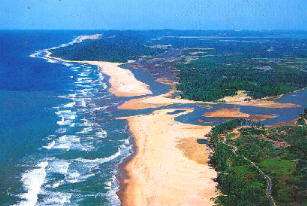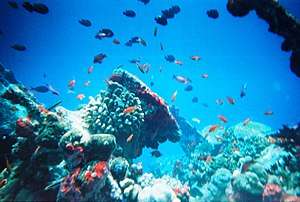Freshwater biology
Freshwater biology is the scientific biological study of freshwater ecosystems and is a branch of limnology. This field seeks to understand the relationships between living organisms in their physical environment. These physical environments may include rivers, lakes, streams, or wetlands.[1] This discipline is also widely used in industrial processes to make use of biological processes such as sewage treatment[2] and water purification. Water flow is an essential aspect to species distribution and influence when and where species interact in freshwater environments.[1]
In the UK the Freshwater Biological Association[3] is based near Windermere in Cumbria.
Freshwater biology is also being used to study the effects of climate change and increased human use.[4]
See also
References
- 1 2 Castillo-Escrivà, Andreu; Aguilar-Alberola, Josep A.; Mesquita-Joanes, Francesc (2017-06-01). "Spatial and environmental effects on a rock-pool metacommunity depend on the landscape setting and dispersal mode". Freshwater Biology. 62 (6): 1004–1011. doi:10.1111/fwb.12920. ISSN 1365-2427.
- ↑ Open University - Sewage treatment processes
- ↑ The Freshwater Biological Association web site
- ↑ Rockström, Johan; Steffen, Will; Noone, Kevin; Persson, Åsa; Chapin, F. Stuart; Lambin, Eric F.; Lenton, Timothy M.; Scheffer, Marten; Folke, Carl. "A safe operating space for humanity". Nature. 461 (7263): 472–475. doi:10.1038/461472a.

